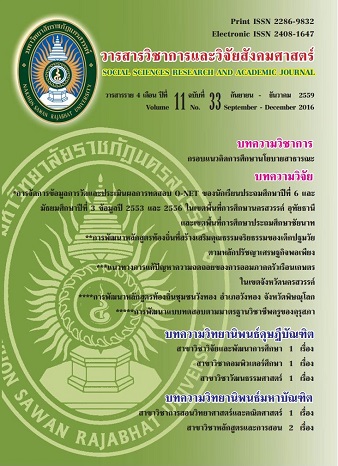ผลการจัดประสบการณ์โดยใช้เกมการศึกษาที่มีต่อความสามารถ ทางคณิตศาสตร์ของเด็กปฐมวัย; The Effect of Experience Management by Using Educational Games on Mathematical Ability of Early Childhood students
Main Article Content
Abstract
บทคัดย่อ
การวิจัยครั้งนี้มีวัตถุประสงค์ 1) เพื่อศึกษาความสามารถทางคณิตศาสตร์ของเด็กปฐมวัย 2) เพื่อศึกษาจำนวนเด็กปฐมวัยที่ได้รับการจัดประสบการณ์โดยใช้เกมการศึกษาที่มีความสามารถทางคณิตศาสตร์ผ่านเกณฑ์ร้อยละ 70 ของคะแนนเต็ม 3) เพื่อเปรียบเทียบความสามารถทางคณิตศาสตร์ของเด็กปฐมวัยก่อนและหลังการจัดประสบการณ์โดยใช้เกมการศึกษา
กลุ่มตัวอย่างในการวิจัย ได้แก่ เด็กปฐมวัย อายุระหว่าง 4-5 ปี ที่กำลังศึกษาในระดับชั้นอนุบาล
ปีที่ 1 ภาคเรียนที่ 1 ปีการศึกษา 2558 โรงเรียนบ้านดงเย็น สังกัดสำนักงานเขตพื้นที่การศึกษาประถมศึกษากำแพงเพชร เขต 2 จำนวน 11 คน ซึ่งได้มาจากการสุ่มตัวอย่างแบบกลุ่ม เครื่องมือที่ใช้ใน การวิจัยประกอบด้วย 1) แผนการจัดประสบการณ์โดยใช้เกมการศึกษา จำนวน 20 แผน 2) แบบทดสอบภาคปฏิบัติวัดความสามารถทางคณิตศาสตร์ ด้านการวัด มีค่าความเที่ยงเท่ากับ 0.74 ด้านการเปรียบเทียบ มีค่าความเที่ยงเท่ากับ 0.77 ด้านการเรียงลำดับ มีค่าความเที่ยงเท่ากับ 0.76 สถิติพื้นฐานที่ใช้ในการวิเคราะห์ข้อมูล ได้แก่ ร้อยละ ค่าเฉลี่ย ส่วนเบี่ยงเบนมาตรฐาน และสถิติที่ใช้ในการทดสอบสมมติฐาน ได้แก่ ไคสแควร์ (Chi-square) และการทดสอบของ Wilcoxon
ผลการวิจัยพบว่า
1. เด็กปฐมวัย จำนวน 11 คน คิดเป็นร้อยละ 100 มีความสามารถทางคณิตศาสตร์ อยู่ในระดับดี
2. เด็กปฐมวัย ร้อยละ 100 ที่ได้รับการจัดประสบการณ์โดยใช้เกมการศึกษา มีความสามารถ
ทางคณิตศาสตร์ ผ่านเกณฑ์ร้อยละ 70 ของคะแนนเต็ม อย่างมีนัยสำคัญทางสถิติระดับ .05
3. เด็กปฐมวัยที่ได้รับการจัดประสบการณ์โดยใช้เกมการศึกษา มีความสามารถทางคณิตศาสตร์คะแนนเฉลี่ยหลังการจัดประสบการณ์สูงกว่าก่อนการจัดประสบการณ์ อย่างมีนัยสำคัญทางสถิติที่ .05
Abstract
The objectives of this research were 1) to study the mathematical abilities of early childhood students, 2) to study the number of early childhood students who have been experienced by using educational game on mathematical ability and passed the standard of criteria at 70 percent of the total scores, 3) to compare the mathematical ability of early childhood students before and after experience of using educational games. The sample group in this research was early childhood students at the aged of 4 to 5 years who are studying in the kindergarten years 1 at Bandonyen School, under the Office of Primary Educational Service Area Kamphaeng phet 2. This research was conducted in first semester, academic year 2558 by 11 early childhood students were selected by the cluster random sampling technique. The research instruments used include: 1) the 20 lesson plans of using educational games in experiential learning management and 2) a practical test to measure mathematical abilities with the measurement reliability coefficient of 0.74, comparison reliability coefficient of 0.77 and sorting reliability coefficient of 0.76. The statistics used for the analysis was percentage, standard deviation (S.D) and the statistics used in testing hypothesis was chi-square and Wilcoxon Signed-Rank test.
The results showed that:
1. The 11 early childhood students (100 percent) have the level of mathematical ability at a good level.
2. The total early childhood students (100 percent) who have been experienced by using educational games passed over 70 percent of the full score of mathematical ability test with the 0.05 level of significance.
3. The early childhood students who have been taught by using educational games have higher scores on the posttest of mathematical abilities than those of the pretest with the level of statistical significance at .05.


